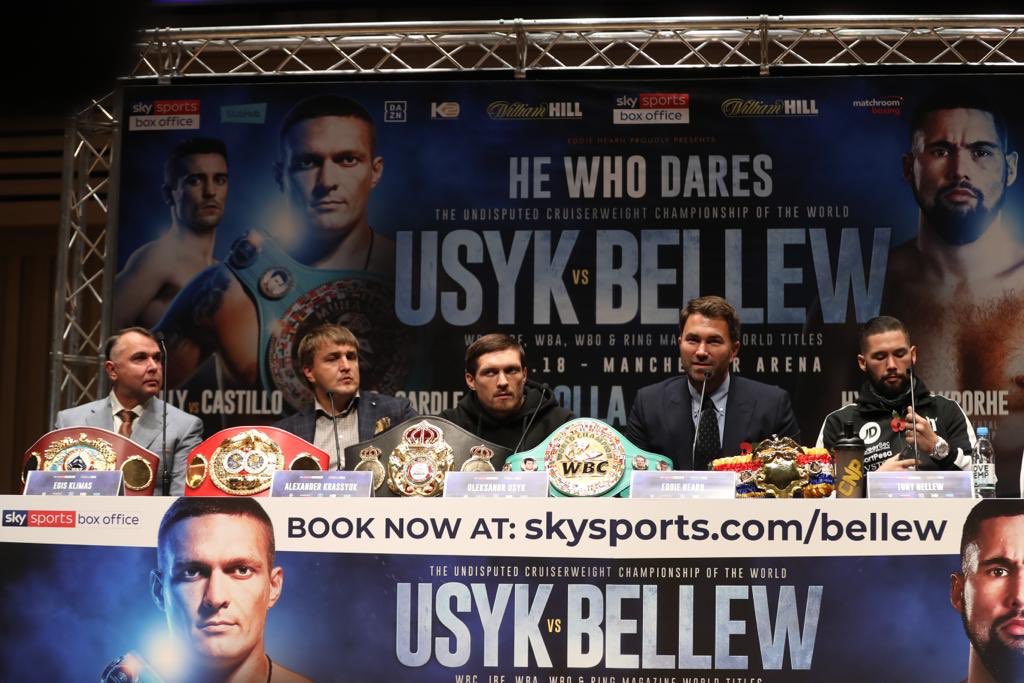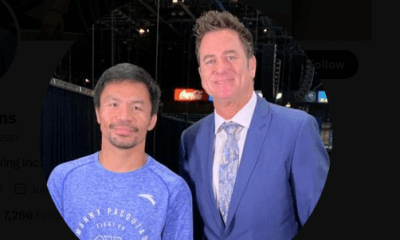Featured Articles
Tony Bellew’s Mission Impossible

It is my opinion that boxers who insist they are going to “take his soul” when discussing a forthcoming opponent can be placed in one of two categories: group A, which is formed exclusively of Bernard Hopkins; group B which is formed entirely of people who don’t understand what it is they are saying.
So Tony Bellew seems bound to join either the former, very exclusive group, or find himself among the unknowing and which way the nut turns depends on his contest with no less a figure than Oleksandr Usyk, a Ukrainian genius pound-for-pounder with a record of 15-0 and the undisputed cruiserweight champion of the world, whose soul Bellew has promised to capture.
“The man’s the biggest monster in boxing, second only to Lomachenko,” Bellew states, but also believes that he will “break his heart.”
It is reasonable for Bellew (30-2-1) to back himself in this way, not least because he is a professional fighter. More than that though, he is on a very decent run across the cruiserweight and heavyweight divisions.
Bellew was beaten thoroughly by Adonis Stevenson back in 2013, struggling with the weight as a light-heavyweight and apparently with his best behind him. Even his best had seen him ranked no higher than seventh by the TBRB.
So many were surprised when Bellew embarked upon a ten fight winning streak that has yet to be ended, not least because after much celebrated back to back stoppages of David Haye the lugubrious Liverpool man retired and turned his gig as a broadcaster for a British sports television company from part time to full time. Bellew, who had achieved a legitimate ranking as a heavyweight behind these two wins, walked away at what was arguably the absolute peak of his career.
That was until he tuned in to watch Usyk’s fight with Murat Gassiev, a fight which was to crown the undisputed #1 cruiserweight in the world and which was, on paper, a close contest. Usyk out-classed Gassiev in a non-competitive one-sided rout and when he had a microphone pushed in front of his face he did what fighters do and called a prospective opponent out.
“I was retired,” as Bellew put it. “Then he said my name.”
Usyk’s selection of Bellew as a prospective opponent made total sense to me at the time. As Bellew put it, “I’ve got what he wants, a name in the UK.” This is a good read from Bellew. Usyk not only called out a British fighter, he signed with a British promoter in Eddie Hearn. Hearn is perhaps the shrewdest operator in promotion today and signing Usyk must be seen in the light of Hearn’s association with world heavyweight kingpin Anthony Joshua. Usyk has been clear for the past two years that when he comes to heavyweight he wants Joshua and he thinks he can beat him. What did Eddie’s signature of Usyk mean for the heavyweight division? Was be being signed to keep him out of Joshua’s ring, a move as old as boxing? Or was he being brought in to ease the matchmaking between the two; was Usyk getting exactly what he wanted?
Before any of that could be properly addressed, a complication emerged.
Bellew-Usyk wasn’t being made at heavyweight. It was being made at cruiserweight.
“He wanted it at heavyweight,” says Bellew. “I gave him a flat no…I’ve got what he wants, a name in the UK, he’s got what I want, them four belts.”
Bellew got his way. Whether it’s because of his existing relationship with Eddie Hearn, or because of Bellew’s name recognition in the British market (the fight is to take place this Saturday in Manchester), the fight was made at cruiserweight rather than heavyweight. There would be no exploratory contest with a small heavyweight for Usyk. He was instead to defend his cruiserweight belts.
Bellew, who had nearly 240lbs sitting on him when negotiations began, has already lost most of them. As of this week he is three pounds above 200lbs and barring disaster is set to make weight comfortably – probably. Occasionally an older fighter, as Sweet Science readers will know full well, can hurt themselves during weight-making and not realize the disaster that has occurred until the bell. Bellew is thirty-five, and although he’s no punching bag, he’s been through it.
Usyk, of course, has been fighting fit at 200lbs for years, having never weighed in at more than 206lbs for a professional contest. This is just the latest and possibly greatest advantage that Usyk enjoys. He is faster, more fluid, more technically assured, he is better balanced, has better footwork and more variety. Stacked against this is Bellew’s greater experience (balanced by Usyk’s amateur pedigree), power, home support, and, according to the man himself at least, heart.
To be fair, this is not a short list and fighters have done more with less; nevertheless it is a fact that the last TBRB ranked contender Bellew dispatched was Ilunga Makabu, who was the world’s #7 cruiserweight back in May 2016. In the intervening thirty months Usyk has by contrast defeated Krzysztof Glowacki (2), Marco Huck (3), Mairis Briedis (6) and Gassiev (2), all in their own boxing homes.
Probably it’s fair to scratch “home support” and “experience” from Bellew’s list of advantages then. This leaves him with power and an alleged superiority in heart. To be fair to him, Bellew has the more proven heart of the two but the fact that a litany of high class opposition has failed even to test Usyk’s tells its own story.
The Ukrainian then, is an overwhelming favorite. When trying to establish just how big an upset a given victory would be I always ask myself what would be said if the underdog won; what volume of internet geniuses would be saying “I told you so!” and more importantly, why?
The only chink in the armor of Usyk in this respect is the Briedis contest. Briedis, who boxes Noel Mikaelian (aka Noel Gevor) at the top of an interesting card in Chicago this weekend, “succeeded in making every round close” but that “Usyk was the clear winner in the great majority of them” according to my coverage of that fight. Most people who want to make Bellew’s chances real point to that contest as the one most in support of their position.
But Briedis troubled Usyk – and the fight was rendered a split decision in Briedis’s native Riga, so whatever my card says, “troubled” is a reasonable word – not by way of pressure and heart (though he showed great bravery) and certainly not by power-punching; rather he tried and failed to out-touch Usyk, to take advantage of Usyk’s perceived lack of power by dialing back the weight of his own shots and trying to out-pop and out-work him.
The idea that Bellew will throw more shots than Usyk in this fight is ridiculous. The idea that he can outland the Ukrainian is preposterous.
And I don’t think he’ll try. Bellew will take the pain while keeping the pressure on and looking to land big hard punches, probably to the body. He may even have some success. But I think a responsible corner would end up pulling Bellew after nine or ten. David Coldwell, who handles Bellew, is an excellent cornerman but he may succumb to Bellew’s ultra macho attitude and “never give up” brand. It’s probable and it is worrying to me that Bellew quitting two rounds before his media career becomes permanent is absolutely impossible due to wider considerations. It may fall to a reluctant referee, then, to pull the injured party late. Barring that I think we are looking at a wide unanimous decision for Oleksandr Usyk.
Because in the end, Bellew may be right: Usyk really may be the second best fighter in the entire world.
Check out more boxing news on video at The Boxing Channel
-

 Featured Articles3 weeks ago
Featured Articles3 weeks agoVito Mielnicki Jr Whitewashes Kamil Gardzielik Before the Home Folks in Newark
-

 Featured Articles4 days ago
Featured Articles4 days agoResults and Recaps from New York Where Taylor Edged Serrano Once Again
-

 Featured Articles1 week ago
Featured Articles1 week agoFrom a Sympathetic Figure to a Pariah: The Travails of Julio Cesar Chavez Jr
-

 Featured Articles3 days ago
Featured Articles3 days agoResults and Recaps from NYC where Hamzah Sheeraz was Spectacular
-

 Featured Articles4 weeks ago
Featured Articles4 weeks agoCatching Up with Clay Moyle Who Talks About His Massive Collection of Boxing Books
-

 Featured Articles1 week ago
Featured Articles1 week agoCatterall vs Eubank Ends Prematurely; Catterall Wins a Technical Decision
-

 Featured Articles4 days ago
Featured Articles4 days agoPhiladelphia Welterweight Gil Turner, a Phenom, Now Rests in an Unmarked Grave
-

 Featured Articles3 weeks ago
Featured Articles3 weeks agoMore Medals for Hawaii’s Patricio Family at the USA Boxing Summer Festival



















